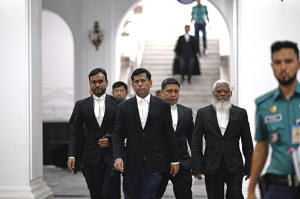Bangladesh tribunal indicts ousted Prime Minister Hasina over deaths of
protesters
[July 10, 2025]
By JULHAS ALAM
DHAKA, Bangladesh (AP) — A special tribunal indicted Bangladesh’s ousted
Prime Minister Sheikh Hasina on Thursday by accepting charges of crimes
against humanity filed against her in connection with a mass uprising in
which hundreds of students were killed last year.
A three-member panel, headed by Justice Golam Mortuza Mozumder, indicted
Hasina, former Home Minister Asaduzzaman Khan and former police chief
Chowdhury Abdullah Al-Mamun on five charges. Hasina and Khan are being
tried in absentia.
The tribunal opened the trial June 5 and asked Hasina to appear.
Authorities published newspaper advertisements asking Hasina, who has
been in exile in India, and Khan to appear before the tribunal.
Hasina has been in exile since Aug. 5. Bangladesh’s interim government,
headed by Nobel Peace Prize laureate Muhammad Yunus, sent a formal
request to India for Hasina’s extradition but India has not responded.
Khan is possibly also in India.
Al-Mamun was arrested and was in the dock Thursday while the judges
indicted them. Al-Mamun pleaded guilty and told the tribunal that he
would make a statement in favor of the prosecution at a later stage.
The prosecution offered a leaked audio of Hasina and other documents as
evidence to the tribunal.
Amir Hossain, a lawyer appointed by the state for Hasina and Khan,
appeared at Thursday's hearing and filed a petition to drop their names
from the case but the tribunal rejected the plea.
The tribunal later fixed Aug. 3 for the opening statement by the
prosecution and Aug. 4 for recording witness statements.

Hasina and her Awami League party previously criticized the tribunal and
its prosecution team for connections to political parties, especially
the Jamaat-e-Islami party.
Filing five charges, the prosecution argued Hasina was directly
responsible for ordering all state forces, her Awami League party and
its associates to carry out actions leading to mass killings, injuries,
targeted violence against women and children, the incineration of bodies
and denial of medical treatment to the wounded.
[to top of second column]
|

Chief Prosecutor Mohammad Tajul Islam, second left, arrives to speak
to the media after a special tribunal indicted Bangladesh’s ousted
Prime Minister Sheikh Hasina by accepting charges of crimes against
humanity filed against her at the International Crimes Tribunal in
Dhaka, Bangladesh, Thursday, July 10, 2025. (AP Photo/Mahmud Hossain
Opu)

The charges describe Hasina as the “mastermind, conductor, and
superior commander” of the atrocities.
The interim government already has banned the Awami League party and
amended relevant laws to allow the trial of the former ruling party
for its role during the uprising.
In February, the U.N. human rights office estimated up to 1,400
people may have been killed in Bangladesh over three weeks of
crackdowns on the student-led protests against Hasina and two weeks
after her fall on Aug. 5.
Earlier this month the tribunal sentenced Hasina to six months in
jail after she was found in contempt of court for allegedly claiming
she had a license to kill at least 227 people. The sentence was the
first in any case against Hasina since she fled to India.
The contempt case stemmed from a leaked audio recording of a
supposed phone conversation between Hasina and a leader of the
student wing of her political party. A person alleged to be Hasina
is heard on the audio saying: “There are 227 cases against me, so I
now have a license to kill 227 people.”
The tribunal was established by Hasina in 2009 to investigate and
try crimes involving Bangladesh’s independence war against Pakistan
in 1971. The tribunal under Hasina tried politicians, mostly from
the Jamaat-e-Islami party, for their actions during the nine-month
war.
Aided by India, Bangladesh gained independence from Pakistan under
the leadership of Sheikh Mujibur Rahman, Hasina’s father and the
country’s first leader.
All contents © copyright 2025 Associated Press. All rights reserved |